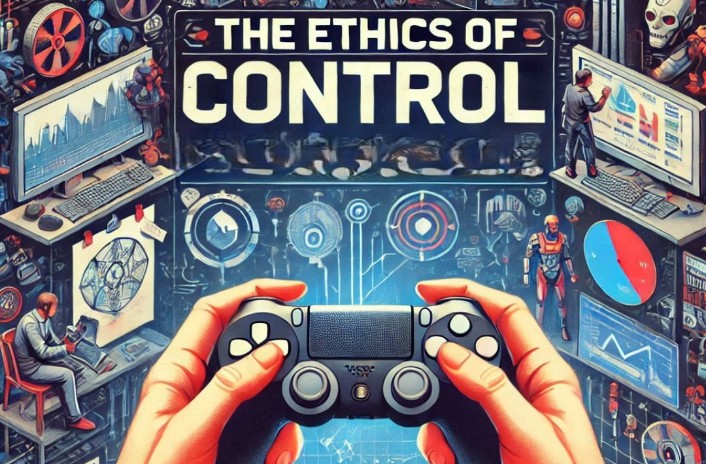The Ethics of Control: Designing Games Where Players Shape Virtual Lives.

In the rapidly changing world of Virtual Reality game development, it now falls on the players themselves to create virtual worlds that can shape entire civilizations, influence society, and control the very fate of entire populations. This is, in turn, bringing both thrilling possibilities and great ethical dilemmas in this new domain of gaming.
The act of creating and manipulating virtual lives in a simulated environment opens up questions surrounding morality, governance, and the potential consequences of such control. As VR continues to evolve, it challenges both players and developers to navigate the complex intersection of entertainment and responsibility.
For decades, gaming has been a form of escapism, allowing players to experience fantastical worlds far removed from reality.However, with the advancement of VR technologies, the line between what is real and what is simulated has blurred.Players can now immerse themselves in experiences where they not only observe but actively shape the course of events within a virtual society.
These virtual worlds, while offering a captivating escape, also raise significant questions about how far a player’s control should extend and the moral implications of such power.
Some of the most ambitious forms of this new wave of gaming are the VR simulations in which players control entire civilizations.They can manipulate everything from the environment to social structures and dictate the lives of virtual beings who behave according to programmed logic.
But when players take on these roles, they often have to make choices that echo real-world moral dilemmas. Should a player build a utopia, one that encourages equality and freedom, or create a dystopia founded on oppression and control? What does it mean to hold the power of life and death in a simulated environment?
These questions speak to a broader issue facing developers: the responsibility of shaping the ethical landscape of virtual worlds. As the technologies within VR continue to evolve, developers have had the challenge of developing experiences not only to entertain but make players reflect on the nature of the decisions they take and their actions. They need to create systems that foster ethical thinking, even in a world that, on paper, was meant to be an escape from the real world.Virtual Reality Developers contribute significantly to this effort, ensuring that these immersive worlds balance entertainment with meaningful engagement, prompting players to consider the broader impact of their virtual choices
In addition, the rise of VR simulations and the complexity of these systems has also fueled the growth of VR companies in India.It makes India a strong hub in a large VR development ecosystem-a place which contributed to the entire global landscape of immersive experiences.Because so many developers in this country, and around it, embraced VR technologies to create interactive worlds, so many also faced unique new challenges related to the ethical considerations. How do the designers make a balance in between these two? How do they make sure virtual governance systems are not only an expression of the personal beliefs of the developers but also develop critical thinking in the minds of players?
Creating these worlds is a sensitive task for vr game development company. As developers build these virtual spaces, they must determine the level of control they should give to the player.Would it just be to play with the environment or have the capability to actually determine the fate of virtual persons?These are huge ethical issues involved in making such choices.In a world where a player’s choice has repercussions not only on the virtual environment but also on virtual citizens, it raises important questions on whether this should be limited.
The ability of VR to impact the behavior of a person in real life is another important element in this debate. While playing in these virtual worlds, people often discover themselves testing the limits of morality. These acts take place in a virtual environment, but they can also mold a player’s view of the world and thereby affect his real-life actions.
An example game that rewards players for creating a just society could have the tendency to make them reflect on how important fairness is in real life, but a game that glorifies authoritarianism or violence might make players immune to the effects of such behavior.Developers must pay attention to the role of the messages they convey by designing their virtual worlds and the actions they direct the players’ attention toward.
The ethical challenges in creating and controlling virtual lives extend to far more than issues of morality and governance. They reach into issues on feelings, exploitation, and treatment of virtual beings.
At the constant advancement of VR technology, it may be possible one day to create virtual characters so lifelike that actual players feel genuine feelings of empathy toward them.How should they be treated?For instance, if one causes damage to a virtual character, does that even matter or is it simply part of the game mechanism? Such questions lead further into broader philosophical issues, including those surrounding artificial intelligence, consciousness, and reality.
Whereas these questions might seem confined to a world of game, in truth, the implications run much further.For example, VR has already been used as a tool for training in fields like medicine, aviation, and even law enforcement.
As the technology advances, it is not too hard to imagine a future where VR is used for more significant social experiments, allowing players to simulate governance systems or societal structures.This leads to an even wider debate regarding whether VR could be a possibility for education and what kind of ethics should go along with this innovation.
In the context of the virtual world, the challenge lies in how VR developers make sure that these virtual worlds are not just mere mindless entertainment but critical thinking and empathy as well.As developers work with new technologies, they have to understand the power they wield to shape the experiences of the players. As they go about creating virtual lives and worlds, they also need to think about the implications of their designs. Will the choices of the players reflect the values they would like to instill or encourage destructive behavior? Will the player leave these games with a better understanding of the world, or will he or she leave more desensitized to the impact of their decisions?
The future years will see VR even more integrated into our lives. As it evolves, so too will the ethical questions it raises. However, the developers and players must still deal with the burden of controlling virtual lives and exercising the power to shape whole civilizations. In this manner, they will continue walking the thin line between fun and morality, between imagination and control.
The future of VR gaming is just as much about the technologies that make it possible but also about the ethical framework to which it will be held accountable.And as VR game development studios continue to push the envelope of what is possible, they will be compelled to consider how they can utilize this powerful medium to facilitate empathy, critical thinking, and moral responsibility.
One thing is certain: ethics of control in VR games is a topic that only will become more relevant with the advancement of technology. It’s a question not just for game developers but for all of us to ponder over the choices we make within the virtual lives. Where, in the world that seems to be fast coming about, virtual realities seem no different from the real life, choices we make may have a bigger impact on our lives than ever.



